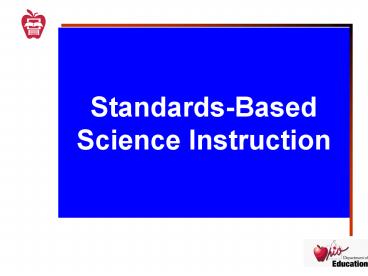Standards-Based Science Instruction - PowerPoint PPT Presentation
1 / 18
Title:
Standards-Based Science Instruction
Description:
Standards-Based Science Instruction Ohio s Science Cognitive Demands Cognitive Demand Types of Cognitive Demand Types of Cognitive Demand Types of Cognitive Demand ... – PowerPoint PPT presentation
Number of Views:62
Avg rating:3.0/5.0
Title: Standards-Based Science Instruction
1
Standards-Based Science Instruction
2
Ohios Science Cognitive Demands
Science is more than a body of knowledge. It must
not be misperceived as lists of topics to be
covered in the six standards in Ohios Academic
Content Standards, K-12 Science. Holistically,
science is a way of studying the natural world.
3
Cognitive Demand
Every Ohio achievement test item for science is
classified on the basis of what the item asks of
the student in terms of reasoning, evaluating
investigative procedures, understanding science
concepts or analyzing scientific information and
technological solutions
4
Types of Cognitive Demand
- Recall / Identify Accurate Science
- Communicate Understanding / Analyze
- Science Information
- Demonstrate Investigative Processes
- of Science
- Apply Concepts / Make Relevant
- Connections with Science
5
Types of Cognitive Demand
- Recall / Identify Accurate Science
- Students provide and identify accurate
- statements about previously learned,
- scientifically valid facts, concepts and
- relationships
- Teachers use a variety of motivators to engage
- students thinking to help them access
- previously learned science knowledge and
- skills
6
Types of Cognitive Demand
- Communicate Understanding / Analyze Science
Information - Students analyze scientific information and
- communicate scientifically, given rich
investigative - scenarios and valid scientific data and
information - Teachers use questioning and science content
- knowledge and content-pedagogy to facilitate
- exploration of standards-based questions,
challenge - misconceptions and help students develop
scientifically - valid conceptions and explanations
7
Types of Cognitive Demand
- Demonstrate Investigative Processes of Science
- Students use scientific inquiry skills,
grounded - in standards-based science content
- Teachers integrate the teaching of standards
- for Scientific Inquiry and Scientific Ways of
- Knowing into opportunities for students to
- conduct investigations aligned with the
content - standards
8
Types of Cognitive Demand
- Apply Concepts / Make Relevant Connections with
Science - Students apply science in the context of
individuals and - society and scientifically analyze
consequences and - alternatives, given real-world situations and
- technological problem-solving scenarios
- Teachers integrate the teaching of standards
for - Science and Technology, Scientific Inquiry and
- Scientific Ways of Knowing into opportunities
to help - students contextualize and expand
understandings of - science content standards
9
Cognitive Demand
Distributing items across the types of cognitive
demand ensures a balance of ways for students to
demonstrate science skills and understandings
10
Implications for Instruction
- Employing instructional strategies that allow
students a variety of ways to demonstrate their
science skills and understanding can improve
student learning
11
Implications for Instruction
- Appropriate use of the cognitive demands focuses
on standards-based, learning-cycle driven science
instruction. This focus is intended to help
support teachers efforts to foster and monitor
inquiry-based student learning opportunities
ranging from engagement and exploration, to
analysis and explanation, to application and
extension.
12
Cognitive Demand
How can the student science rubric help inform
classroom instruction to improve student
performance?
13
Standards-based Instruction
- Research suggests that student achievement is
positively impacted by - Teaching for transfer by providing students with
a variety of tasks - Varying the complexity of tasks and emphasizing
higher-order thinking skills - Teaching for mastery and helping students reflect
on their learning - D. W. Tileston. ( 2000.) Ten Best Teaching
Practices - R. J. Marzano. (2003.) What Works in Schools
14
Standards-based Instruction
- Research suggests that student
- achievement is positively impacted by
- Ensuring multiple exposure to, and complex
interactions with knowledge - Comparing classroom or individual student data to
statewide data to reveal gaps in instruction or
student experience - D. W. Tileston. ( 2000.) Ten Best Teaching
Practices - R. J. Marzano. (2003.) What Works in Schools
15
Implications for Instruction
- Dialogue between pupils and a teacher should be
thoughtful, reflective, focused to evoke and
explore understanding, and conducted so that all
pupils have an opportunity to think and express
their ideas. - Inside the Black Box Raising Standards Through
- Classroom Assessment
- by Paul Black and Dylan William
16
Implications for Instruction
- Reflection
- Feedback provided without evaluations or grades
helps to avoid feelings of failure but comments
help to identify both strengths and weaknesses
and promote self-awareness and reflection. - Inside the Black Box Raising Standards Through
- Classroom Assessment
- by Paul Black and Dylan William
17
Implications for Instruction
- Homework
- Feedback on tests, seatwork and homework should
give each pupil guidance on how to improve, and
each pupil must be given help and an opportunity
to work on the improvement. - e.g., conducting and analyzing science
investigations - Inside the Black Box Raising Standards Through
- Classroom Assessment
- by Paul Black and Dylan William
18
Aligning to the Standards
Click on the following links to learn more
about The Learning Cycle and Classroom
Inquiry Standards-based Science
Instruction Standards-based Science
Assessment Teacher Tools for Reflecting on
Teaching Science Student Tools for Reflecting on
Learning Science































